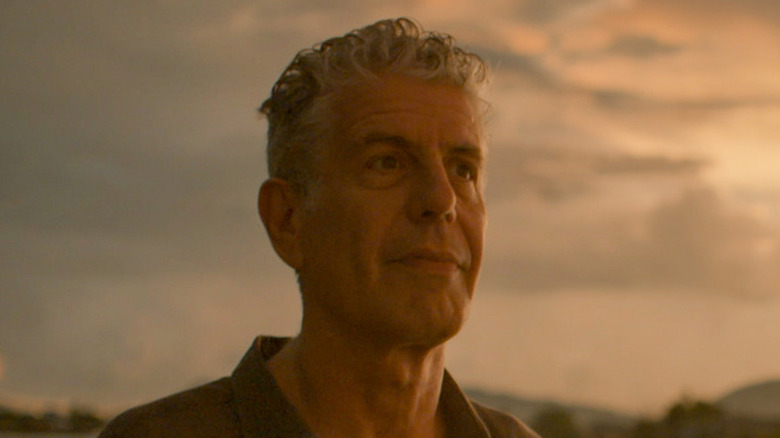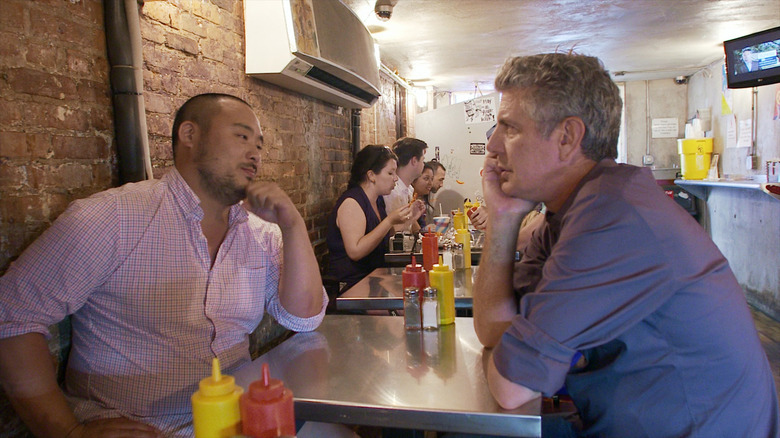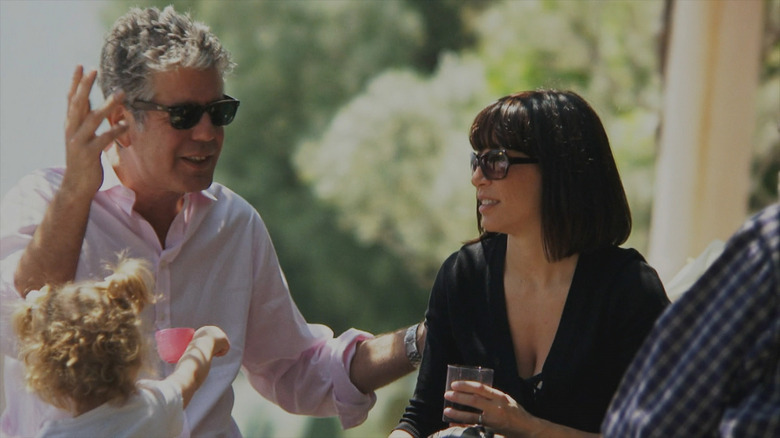Roadrunner Review: A Fitting Tribute
When chronicling the life of a deceased, beloved public figure, so many documentarians fall into the unfortunate tendency to lionize their subject. But rather than sully Anthony Bourdain's memory with the kind of overly sentimental hagiography he himself would have hated were he here to see it, Morgan Neville's "Roadrunner" engages with the man's legacy on more intimate terms.
It is at once a rich portrait of the celebrity chef and author that should prove fascinating to hardcore fans and foodie culture agnostics alike, while dually functioning as a safe space for some of Bourdain's closest collaborators and friends to unpack their still raw feelings about his 2018 suicide. "Roadrunner" definitely ticks all the expected boxes for a cradle-to-the-grave approach to biographical storytelling, but it does so with enough charm, wit and roughhewn texture to at least come close to presenting the man's life with the same vigor and brutal honesty he was known for.
But for those expecting this to be some kind of tawdry post-mortem on the circumstances surrounding his death, "Roadrunner" provides no simple or conclusive answers. His passing came as a shock not just to his many admirers around the world, but more importantly, those closest to him. While Neville's nimble storytelling presents a great deal of insight surrounding Bourdain's final days, it works best as a thorny celebration of his complex life rather than the long-awaited conclusion to an international why-dunit.
Humble beginnings
Much of the film's first half dispenses with pretty much everything one might expect from a documentary like this. The popularity of Bourdain's travelogue series "No Reservations" and "Parts Unknown" means even the most clueless viewer with little to no prior Bourdain knowledge will go in understanding the broad strokes of his rags-to-riches narrative.
A recovering addict and wanderer who found solace working as a chef, Bourdain's first entrance into the public consciousness was his 2000 memoir "Kitchen Confidential," a striking tome that debuted his unique voice and perspective not just on the culinary arts, but the world at large. The book was a success, bringing financial stability to a man whose entire adult life had been lived on the margins, scraping by. But while most people are familiar with the rest of Bourdain's arc, his meteoric ascent to one of the most fascinating and sought-after cultural voices of the modern era, "Roadrunner" is a smart enough film to take some time showing us what that transition was actually like.
There's a lot of great footage of Bourdain in the months leading up to the book's publication, following him around his day job and in his more introspective moments at home. Once the book blows up and he makes the shift to television presentation, we get to see tons of b-roll and behind the scenes recordings showing a man who has not yet adapted to being some kind of celebrity. A man who never thought he'd publish a book, much less a New York Times bestseller, now figuring out how to be on camera.
Through interviews with his longtime producing partners, we discover that a man who has been synonymous with travelogues for the last two decades had not, himself, ever truly traveled abroad. A voracious film buff, Bourdain possessed a sort of platonic ideal of what foreign locales would be like from the fiction he had consumed. So much of the appeal of his early work on screen is his new experiences providing audiences a fresh lens on other cultures.
These "prequel" vibes in the first act prove illuminating enough to forgive much of the film's telegraphed middle, exploring fame and ubiquity through talks with his many famous friends, from rocker Josh Homme to artist David Choe. It's all the expected stuff about his impact, his cultural footprint, and the way his voice and authorial ownership of his various television programs evolved over time. As rote as it begins to feel, there's something truly captivating about seeing the specific way Bourdain approached television production, overcoming his initial jitters and irascible attitude to see filming as an extension of his writing.
But even in these so-called halcyon days, there are plenty of asides and interludes to seed what we all now know to be true, that even as he found love, marriage, and fatherhood alongside fame and fortune, this was a man whose life had taken many curious turns already. "Roadrunner" loosely posits that perhaps Bourdain was too hungry for new experiences and new thrills to ever properly settle into the family man he had become.
Tragic Endings
The film's final act picks up a lot of the telltale threads that imply a sort of mid-life crisis for Bourdain. An extended foray into his surprising love for Brazilian Jiu-Jitsu seems to suggest that, even on top of the world, the man continued to thirst for more, and in a way that clearly clashed with maintaining a stable home life for his second wife Ottavia Busia and daughter Ariane.
Following their divorce and the start of his controversial relationship with actor and filmmaker Asia Argento in the final years of his life, "Roadrunner" shrewdly pivots to a thornier perspective. The various talking heads segments, featuring crew members from the show and Busia herself, aren't the usual reserved observations from biographers and gossip writers one might find on TV specials about famous life stories, but instead raw nerve confessionals from a close-knit group of people still processing this loss. None of them pull punches about their frustrations with the ways he changed and acted out preceding his decision to end his own life.
Some fans will no doubt leave this film calling Argento the "Yoko" of "Parts Unknown," but "Roadrunner" never ascribes such guilt to his then-girlfriend, instead honing in on all the ways Bourdain transformed himself to mirror her presence in his life. There's a trio of profoundly disappointing scenes late in the film centering around his decision to let Argento direct the Hong Kong trip for the show, a choice that put him directly at odds with all the people who helped make his series so popular in the first place.
In quick succession, Bourdain begins to defer many creative decisions to Argento, treating their documentary production like an art film. This includes fussing over camera angles, interrupting a heartfelt interview with some asylum seekers to re-stage the scene like they're rehearsing a play and, ultimately, firing the show's longtime cinematographer Zach Zamboni for disagreeing with their new director. This depressing betrayal is best portrayed with footage from the shoot of former Wong Kar Wai collaborator Christopher Doyle, a personal favorite of Bourdain's, shooting material for the show, and turning his camera to Zamboni, the man personally responsible for the look of the show up to this point. Hearing Bourdain's team pick the shoot apart is painful, but not as heartbreaking as one particular confessional from restauranteur David Chang.
Chang struggles to even talk about this in the film, but he reveals a cruel moment in their friendship when Bourdain told him he would never be a good father. In the scene, Chang breaks into tears, as he and Neville surmise that this was in fact just callous projection — that Bourdain himself was struggling with his perceived failures as a parent and lashing out at those around him.
It's the closest "Roadrunner" gets to giving answers to anyone trying to wrestle with why a man who had so much could take his own life, but it smartly sidesteps devolving into group therapy. The film comes close to concluding with some sappy footage of Bourdain reflecting on his life on a beach before Choe points out to Neville how disgusted Bourdain would be by seeing a film end this way.
Instead, it does its best to give the people in his life an opportunity to find something resembling closure while still paying tribute to the brash spirit he embodied, a kind and difficult gesture the man himself might applaud.


